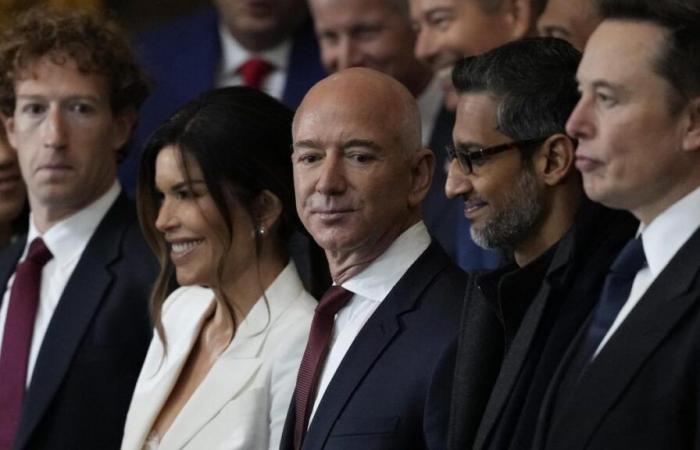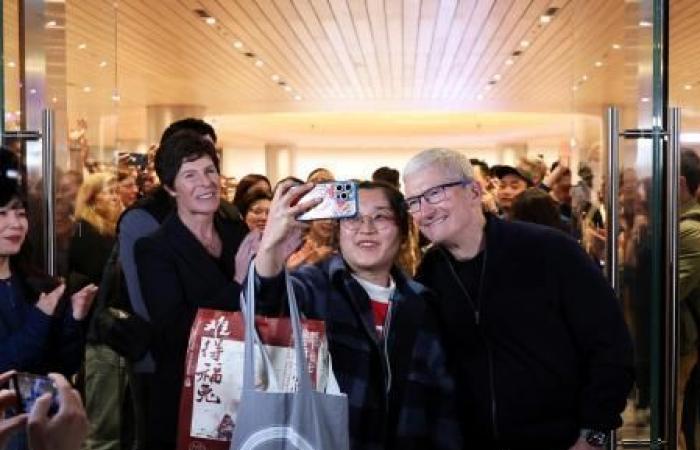In the weeks after the re -election of Donald Trump, the owners of the American technological giants struggled to meet with the re -elected president; They congratulated him in public and gone into their inauguration. Mark Zuckerberg, Executive Director of Meta, got rid of praise in stating that it was great to have a “proud” government of US technological referents.
There were good reasons for so much gift. during the campaign, Trump referred to the goal as an “enemy of the people.” Many members of their magic movement have accused the technological giants of censoring the opinions of the right. In 2021, JD Vance, now Vice President of Trump, called those “parasites.” Even technology experts surrounding Trump, such as Elon Musk, belong to a different tribe of Silicon Valley that distrusts large technological companies.
Three months have passed and the mandamases of the most valuable companies in the United States have little to show in exchange for their adulation. Trump does not seem willing to free them from the claws of antitrust regulators and is aggravating the problems with their commercial war. On April 29, the White House accused Amazon of “hostile and political act” after it was announced that the company planned to show the cost of tariffs in the items sold through its website. (Amazon hastened to clarify that the idea had only been considered for Amazon Haul, where very cheap products are sold, and that it had been ruled out.)
Since Trump’s possession, the combined market value of the five major platforms (Alphabet, Amazon, Apple, Meta and Microsoft) more NVIDIA, the American superstar of the semiconductors, has fallen into 2.3 billion dollars, that is, 16%. How far can the situation get?

A bag operator during the convulsions of falls caused by Trump’s decisionsTIMOTHY A. CLARY / AFP
Let’s start with antitrust legislation. Neither Andrew Ferguson, appointed by Trump President of the Federal Commerce Commission (FTC), nor Gail Slater, chosen to direct the antimonopoly division of the Department of Justice (DOJ), have shown much interest in stopping cases against the great technological ones initiated by the Biden government. Slater, which on April 21 described Google as a threat to freedom of expression, freedom of thought and the “free digital markets from the United States,” two cases have inherited against Alphabet, the Google parent company. On April 17, a district judge ruled in one of them that the company operates an illegal monopoly in the field of digital advertising. In the other case, a court ruled last year that Google’s searches also was an illegal monopoly; The views to decide the corrective measures will begin on May 2. The DOJ has urged the court to force Google to sell the Chrome browser, in addition to introducing other changes in its activities.
The Trump administration has not shown too much interest in stopping open processes against Google in Biden era
Alphabet is not alone. On April 14, the views began in the case of the FTC against Meta, a company to which the regulator accuses of having maintained an illegal monopoly through the purchase of Instagram in 2012 and WhatsApp in 2014 (something that the company denies). It seems that Meta has requested Trump’s help to reach an agreement with the FTC, so far without great success. Antitrust organisms have also sued Amazon and Apple and, incidentally, are also investigating Microsoft and Nvidia.
To all this is added Trump’s commercial war. Apple assembles in China four fifths of the iPhones and the Macs, which explains that the price of its shares fell almost a quarter in the week following the announcement by Trump, on April 2, of an imposition of “reciprocal tariffs”. The actions recovered something after the announcement of exceptions to phones and personal computers. However, the application of a 20% tariff to Chinese products is still in force. It is likely that the prices of the iPhones rise, which will affect sales that are already slowing down. As reported, Apple plans to transfer the assembly of its mobiles for the United States from China to India at the end of 2026.

Apple president Tim Cook, at the opening of an Apple store in ShanghaiStringer / Reuters
Nvidia is also in the spotlight. The prices of their chips, which occur mostly abroad, will also rise to American customers, which could cool the vertiginous growth of the company. An even greater problem is its business in China, which represented 13% of corporate income in 2024. Recently, the US government has forbidden to sell the H20 chip to that country without an export license. Nvidia has affirmed that the new standards will mean a loss of 5.5 billion dollars in the value of their stocks, which indicates that he hopes to obtain few permits (if he obtains any). Although analysts consider that it will design a new less powerful chip for export, new restrictions will give Huawei impulse, a Chinese technological giant that is manufacturing increasingly sophisticated artificial intelligence chips.
As for Amazon, Bernstein estimates that around a fifth of the products he sells in the United States through its electronic commerce platform they are manufactured in China; Many of them now face import tariffs of 145%. On May 2, the exemption of Minimis will also be eliminated, which exempts packets with Chinese products valued below $ 800 from tariffs.
American technological giants run the risk of becoming lightning rods in the commercial war
To make things worse, American technological giants also run the risk of becoming a “reprisal lightning rods” in the commercial war, says Mark Shmulik, of the Bernstein brokerage. Chinese authorities are already investigating Alphabet and Nvidia. Last year, the country introduced rules to gradually eliminate Microsoft products, such as Windows, of government computers. Investors are concerned that the following is an iPhone prohibition among state officials.
The president of the European Commission Ursula von der Leyen has talked about hitting American technological giants in response to Trump’s tariffs. On April 23, the European Union imposed on Apple and target fines of 700 million euros for violating the Digital Markets Law; The figure has been much lower than the maximum possible, which perhaps indicates that Brussels wants to avoid an escalation of the commercial conflict.

Then there are the indirect effects of Trump’s tariff war. Advertising sales to Chinese companies of electronic commerce such as Shein and Temu, which depend largely on the minimis trade, could be compromised. Last year, Meta said that these companies had represented a tenth of the advertising income of the previous year. On April 25, Losco Pichai, executive director of Alphabet, admitted at a conference on results that the elimination of Minimis exemption would mean a “slight wind of bow” for its advertising business. It could be just the beginning. If, as expected, the American economy is slowed down as a result of tariffs, advertising spending in general could collapse.
Also affected by cloud computing income of large technological ones could be affected. According to the JPMorgan Chase Bank, business clients and startups are already delaying contract signing due to uncertainty about the economic situation. It seems possible that there is a decline in the expense in artificial intelligence (AI), an area in which the great technological have deposited their hopes of growth. Pharmaceuticals Johnson & Johnson recently announced that it will cut out the expenditure on AI projects that do not generate benefits.
There are those who remain optimistic and believe that the rest of the president’s mandate will be more favorable for large technological companies. An internal source of one of those giants states that he believes that Trump, unlike his predecessor, is willing to “rise” to defend US technology companies abroad. However, the first 100 days of the presidency do not predict anything good. They could be four complicated years for technological titans.
© 2025 The Economist Newspaper Limited. All rights reserved
Translation: Juan Gabriel López Guix










